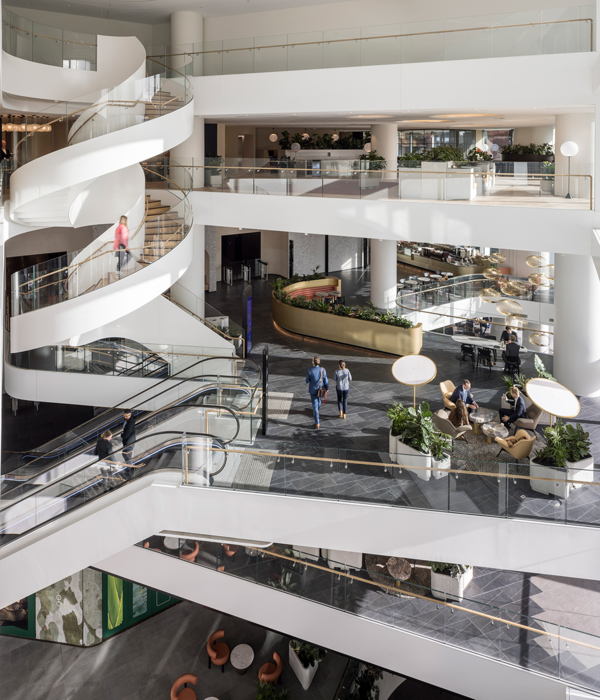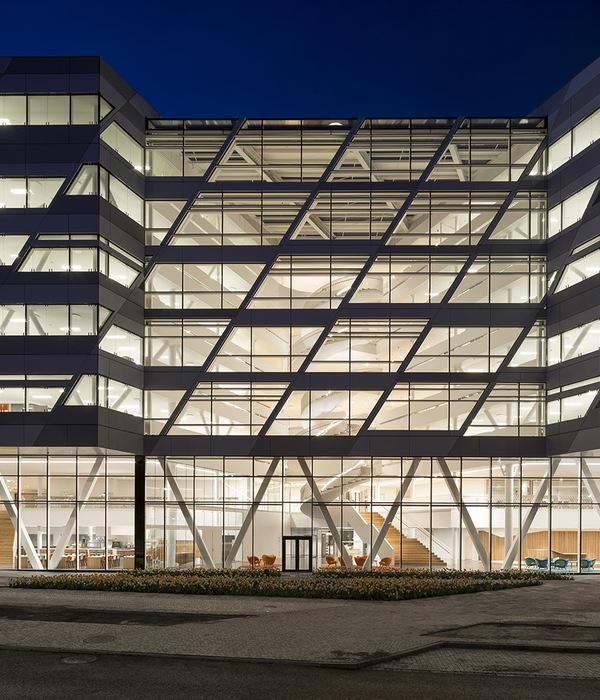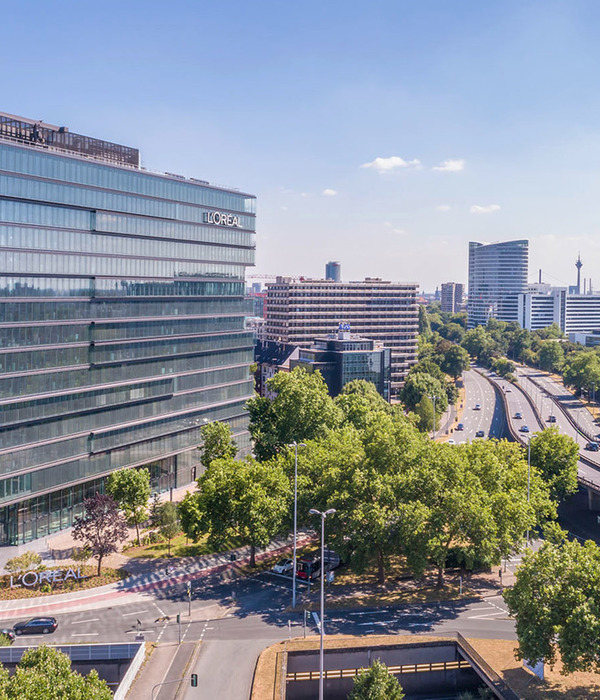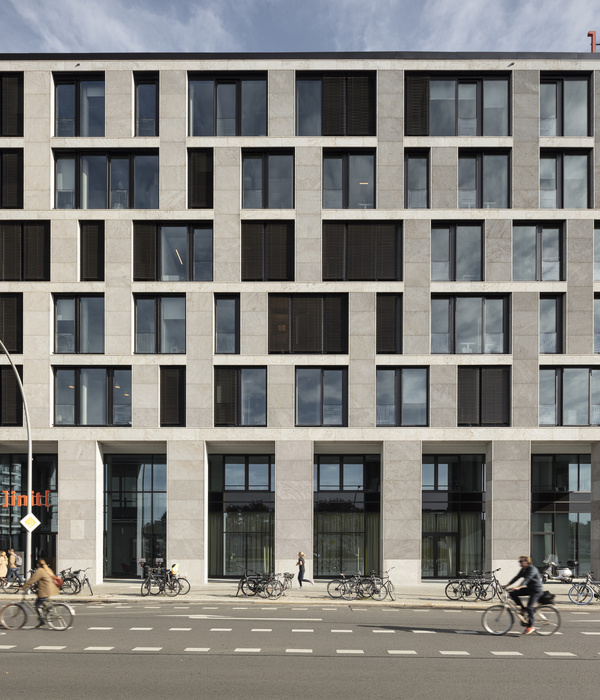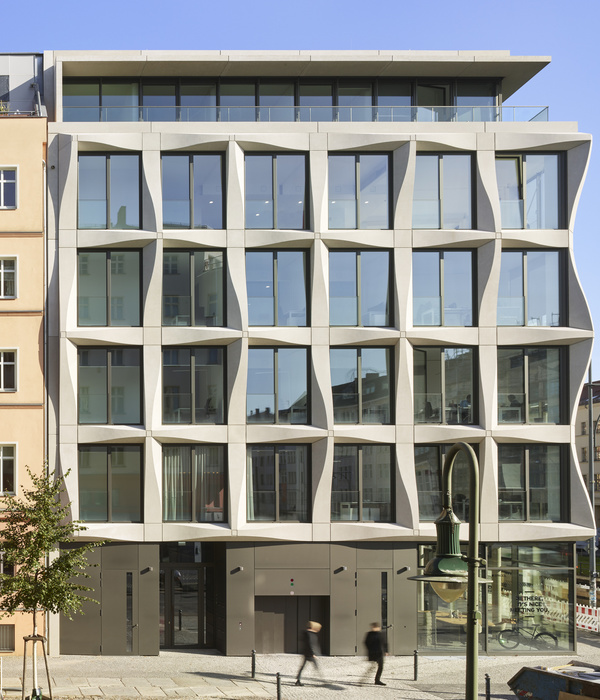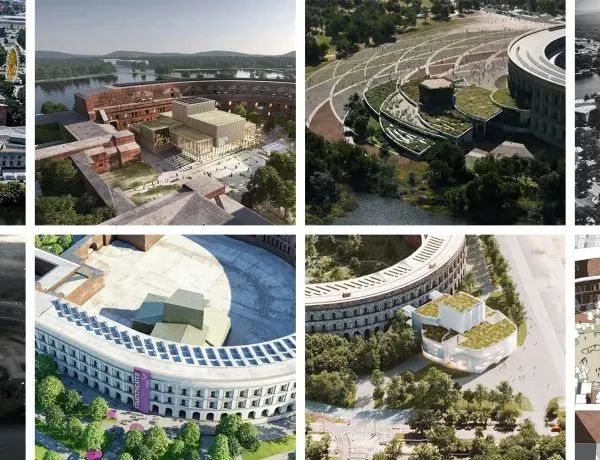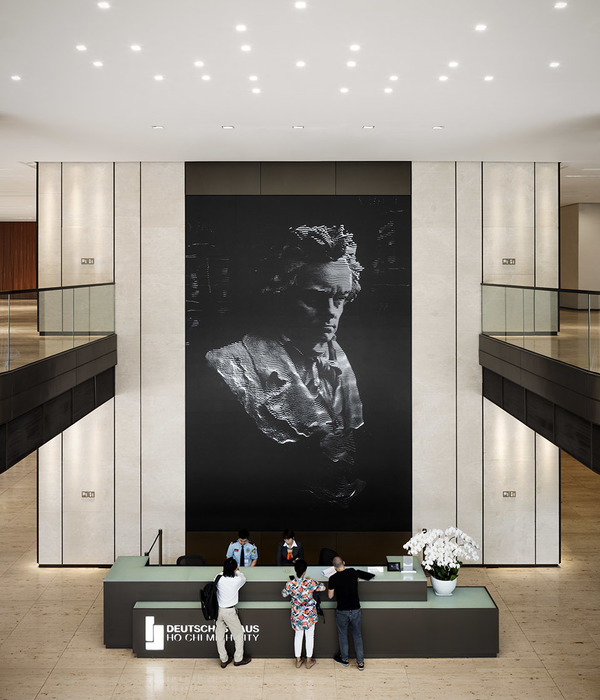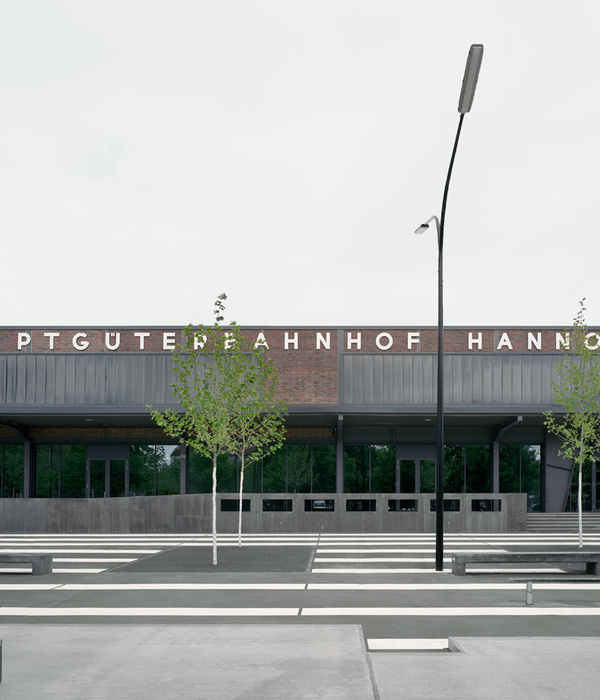Kainua是一座古老的伊特鲁里亚城市,位于现在的Marzabotto镇附近。Ca’是山地农舍的典型名称;Inua是一个因纽特语词汇,意为“万物之本质”,指的是一种统一所有生灵的精神概念,亦是生命之间的和谐原则。该因纽特短语的注音成为了农场的logo。
Kainua is the ancient Etruscan city that stood near the current town of Marzabotto. Ca’ is a reference to the typical toponyms of mountain farmhouses. Inua is an Inuit language word that means “the essence of all things”, it is a spiritual concept that unites all beings and that is the principle of harmony between the living. The phonetic form of the Inuit term is the farm logo.
▼建筑外观,external view of the building ©Fabio Mantovani
新建筑是一个由石材和木材组成的体量,植根于山间,与山地融为一体。这栋建筑遗世独立,与原始的自然能量以及山中的景观地形紧密相连。项目所处的环境优美壮观,需要设计以谨慎的方式回应。新的建筑必须呈现出永恒性,成为自然景观中的元素之一。
The new construction is a volume in stone and wood that has its roots in the mountain with which it forms a whole; a solitary object that expresses an intense relationship with the primordial energy and the geology of the mountainous landscape. The beauty and grandeur of the landscape in which the project is inserted required a delicate and careful approach, the new building had to present itself as a timeless object, one of the elements of the natural landscape.
▼由石材和木材组成的体量,volume consists of wood and stone ©Fabio Mantovani
项目是艺术家二人组Panem et Circences的住宅兼工作室,由一栋老农舍拆建改造而成。建筑包含两层,一层的部分空间埋入地下,加强与自然的联系,将人的视线拉近地面,改变了使用者对于内外关系的认知。
The house and work space of the artistic duo Panem et Circenses, obtained from the demolition and reconstruction of the old farmer’s house, develops on two levels, the ground floor is partially embedded in the ground to strengthen this building / nature link; a graft that changes internal / external perception by bringing the gaze line closer to the ground.
▼区位分析,location analysis ©Ciclostile Architettura
▼分解轴测图,exploded axonometric ©Ciclostile Architettura
拆除原有建筑获得的石材被重新运用在了一层新石墙的建造中,位置和老墙一致,是新建筑和改造谷仓之间的连接元素。新建部分坐落在主建筑二层,结构采用交错层板,优雅地植入到了韵味深厚的景观之中。立面覆以烧焦的木板,这是一种古老的木材处理技术,不仅在亚平宁山脉,遥远的世界各地都有使用,是一种兼收并蓄、受人欢迎的共同建筑语言。
The stones obtained from the demolition have been recovered and reused for the new stone wall on the ground floor (rebuilt on the footprint of the old wall), a connecting element between the new house and the renovated barn. The new portion, with structure in X-LAM panels, overlooks the main front only on the first floor, gracefully inserting itself in a strongly connoted landscape. The covering is in burnt wood, an ancient technique that we find in our Apennines but also in very distant places all over the world, a technique inextricably linked to the territory but projected everywhere, an inclusive and welcoming common language.
▼重建的老墙体连接新建筑和谷仓,reconstructed old walls connecting the new building and the barn ©Fabio Mantovani
▼新体量设于二层,new structure on the first floor ©Fabio Mantovani
▼立面近景,采用烧焦木材 closer view to the facade composed of burned wood ©Fabio Mantovani
室内,硬质表面和软质表面形成对比,前者包括生活区地下室部分的混凝土和浴室的马赛克,后者如杉木地板和墙面等,唤起了场所的朴素本质。每种元素都适当地回应了特定的需求,在材料的选择上诚实地展现了自身的特征。
Internally the dialectic between “hard” surfaces (the concrete of the basement portion of the living area, the mosaics of the bathrooms) and “soft” surfaces (fir wood used as floors and coverings) recalls the essentiality and austerity of the place. Each element is optimized to respond to a need that honestly denounces itself through its material choice.
▼室内设计轴测图,软硬表面形成对比 axonometric of the interior with dialectic between hard surfaces and soft surfaces ©Ciclostile Architettura
室内布局遵循设计对场所的解读及其固有的特性,最大程度发挥原有空间的潜能。所有服务用房均设于北侧,立面开设小窗;相应地,项目南侧一层设置起居室和厨房,二层为卧室,拥有巨大的开窗。一层窗户的遮阳右上方悬挑出的二层空间完成,二层则设置专门的遮阳系统。这样的开窗策略不仅可以最大化寒冷季节的能源供给效率、避免夏季的阳光直射,还可以带来绝美的山谷风光。
The internal distribution, dictated by the reading of the place and its intrinsic characteristics, requires us to make the most of the existing potential. The service rooms are all located on the north front and have small windows while in the south the living area / kitchen on the ground floor and the bedrooms on the upper floor have large openings. The openings on the ground floor are simply shielded by the overhang of the first floor while those in the bedrooms are equipped with a shielding system. These openings, in addition to maximizing the energy supply in the cold seasons and preventing direct radiation in the hot ones, offer a breathtaking view of the valley.
▼不同立面采用不同的开窗策略 different openings on different surfaces ©Fabio Mantovani
▼一二层开窗采用不同的遮阳方式,openings on the ground and first floors using different shielding methods ©Fabio Mantovani
▼入口,entrance ©Fabio Mantovani
▼起居空间概览,overall view of the living area ©Fabio Mantovani
▼开放的空间和巨大的开窗,open space and large windows ©Fabio Mantovani
▼餐厅和开放厨房,dining area and open kitchen ©Fabio Mantovani
▼卧室,bedrooms ©Fabio Mantovani
▼走廊,corridor ©Fabio Mantovani
▼卫生间,bathroom ©Fabio Mantovani
整个房屋都包裹了厚厚的木纤维保温板,仅需要一套空气系统就可以完成室内温度的调节,所用的能源主要来自于谷仓屋顶上的光伏板,这样的设置可以减少光伏板的视觉影像。雨水被收集在水箱中,可以用来灌溉;由于房屋旁边有两片池塘,植物性净水装置也可以发挥作用。
The whole house is insulated with a very thick wood fiber coat that allows us to use as heating / cooling only an air system powered mostly by photovoltaic panels located on the roof of the barn to mitigate its visual impact. Rainwater is collected in tanks and reused for watering the fields while the purification plant consists of a phytodepuration that works thanks to two ponds adjacent to the house.
▼能源分析,energy analysis ©Ciclostile Architettura
谷仓的改造主要包括结构的介入和基础设备的安装。现在它被用作农业活动的仓库,一段时间之后,随着接待设施的建造,这里也可以用来迎接访客。
The barn has been renovated with mainly structural interventions and equipped with all the basic plant equipment. Today it is used as a warehouse for agricultural activities, over time a receptive structure will be created to welcome visitors.
▼夜景,night view ©Fabio Mantovani
▼雪景,snow view ©Artistic duo Panem et Circenses
▼一层平面图,ground floor plan ©Ciclostile Architettura
▼二层平面图,second floor plan ©Ciclostile Architettura
▼细部,details ©Ciclostile Architettura
Location: Medelana, Marzabotto (BO) Client: Artistic duo Panem et Circenses Tipology: Renovation Area: 400 square meters Consulent: EN7 srl, RES srl, Per. Ind. Federico Giovannini, Stefano Mattei Construction company: Vibrobloc Srl Status: 2017 – 2019 Prize: Prize for interventions made by young designers, In / Emilia-Romagna Architecture 2020 Photo: Fabio Mantovani Winter photo: Artistic duo Panem et Circenses
{{item.text_origin}}

